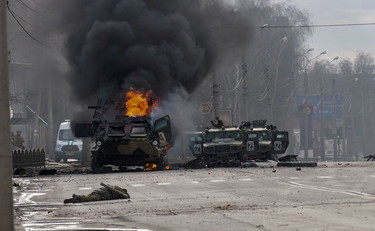US President Joe Biden met with G7 allies Thursday to hammer out a raft of new sanctions against Russia after it invaded Ukraine, and will later speak to the American people on a crisis that he warns will cause “catastrophic loss of life.”
The virtual, closed-door meeting of G7 leaders — Britain, Canada, France, Germany, Italy, Japan and the United States — started at 9:17 am (1417 GMT), a White House official said.
“President Biden and leaders are discussing their joint response to President Putin’s unprovoked and unjustified attack on Ukraine,” the official said.
Before the G7 gathering, Biden first huddled with his National Security Council in the Situation Room, the White House said. His speech to the nation was scheduled for 12:30 pm (1730 GMT).
For weeks, as Russia built up tens of thousands of troops and heavy weapons on Ukraine’s border, Biden has led NATO and other European allies in trying to craft a package of what Washington says are “unprecedented” sanctions as a deterrent.
Now that the deterrent has failed, the effort is likely to see rapid escalation to inflict real pain on Russia’s already shaky economy.
“The United States and its allies and partners will respond in a united and decisive way. The world will hold Russia accountable,” Biden said in his first comments late Wednesday in Washington, after Russian missiles began to rain down on Ukraine.
Biden also held a phone call with his Ukrainian counterpart Volodymyr Zelensky, saying afterwards that he had promised to “provide support and assistance to Ukraine and the Ukrainian people.”
The US president noted that Zelensky had requested him to “call on the leaders of the world to speak out clearly” against Putin’s “flagrant aggression.”
On Tuesday, after Putin first announced he would send troops as “peacekeepers” to two small areas already controlled by Moscow-backed separatists, Western countries swung into action with a first round of sanctions.
The US government joined European allies in imposing sanctions on two Russian banks, Moscow’s sovereign debt, several oligarchs and other measures.
And on Wednesday, as the Russian invasion force became clearly primed to attack, Biden announced he was imposing sanctions on the Nord Stream 2 natural gas pipeline from Russia to Germany — one of energy-rich Moscow’s highest-profile geopolitical projects.
Germany had earlier announced it would block the pipeline from opening for deliveries.
– ‘Cut off’ Russian economy –
Now, US officials are teeing up tougher new sanctions that could include targeting bigger banks, more oligarchs close to Putin and, crucially, a ban on exports to Russia of high-tech equipment and components. It was not clear how many of these measures would be announced Thursday.
Germany’s vice chancellor, Robert Habeck, signalled Thursday there’d be a “strong sanctions package” that will “cut off the Russian economy from industrial progress, will attack and freeze assets and financial holdings, and will dramatically limit access to the European and American markets.”
“No Russian financial institution is safe,” State Department spokesman Ned Price said Wednesday, hours before the invasion was launched.
Some measures also risk serious economic fallout for Western countries and could imperil the global economy recovery after the Covid pandemic. Already stock markets are tumbling and oil prices are soaring over $100 a barrel.
Among the more controversial sanctions would be directly targeting Putin, who is widely reported to have amassed a vast, secret fortune during his two decades running Russia.
Arguably the highest stakes sanction would be cutting Moscow off from the SWIFT international banking network. This would at least for some time disconnect Russia from basic commerce, hugely disrupting the economy, but it would also carry considerable potential aftershocks to the wider, US-led financial system.
Soon after the Russian attacks began, US senators from both parties indicated support for a tough response.
“Tonight, the entire post-World War international order sits on a knife edge. If Putin does not pay a devastating price for this transgression, then our own security will soon be at risk,” Democratic Senator Chris Murphy said.
Republican Senator Mitt Romney warned against “the peril of again looking away from Putin’s tyranny” and urged “the harshest economic penalties” and “expelling them from global institutions.”
AFP



